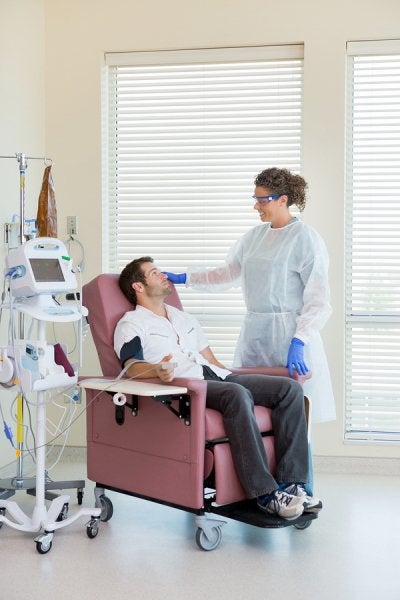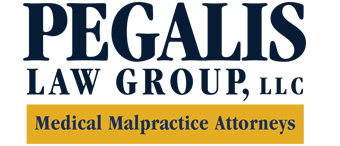-
What Are the Symptoms of Sepsis?
Sepsis is a life-threatening condition that results when the body is trying to fight off an infection, causing injury to its own tissue and organs. If a medical professional who is providing care for you has failed to identify sepsis, it may be considered medical malpractice. It’s important to know what the warning signs of sepsis are so that you can seek treatment right away if you experience them. The symptoms of sepsis include sudden fever or low body temperature, breathing much more quickly than usual, a rapid heartbeat, feeling severely confused or disoriented, and finding yourself short of breath. If you have more than one of these symptoms, treat it as a medical emergency.
 If you are concerned about a misdiagnosis or possible medical error, contact the law firm of Pegalis & Erickson, LLC, in New York. For 45 years, we have advocated for people of all ages, in order to help our clients financially and make healthcare safer for everyone. You can reach us today by calling (516) 684-2900.
If you are concerned about a misdiagnosis or possible medical error, contact the law firm of Pegalis & Erickson, LLC, in New York. For 45 years, we have advocated for people of all ages, in order to help our clients financially and make healthcare safer for everyone. You can reach us today by calling (516) 684-2900.Attorney Advertising
-
How Long Do You Have to File a Medical Malpractice Lawsuit?
If you are considering filing a medical malpractice suit, one of the first things you’ll need to know is how long you have to do it. The time for bringing a lawsuit is called the statute of limitations. If the statute of limitations expires, you cannot file a lawsuit. The rules governing when you can file a medical malpractice suit differ from state to state. In New York, there are different time limits to file a lawsuit based upon the entity, whether the injured party is a minor or an adult, and also whether the person is alive or deceased. Time limits in which to bring a lawsuit are often complicated. To ensure that you don’t miss the deadline, talk to an experienced medical malpractice attorney as soon as possible after you suspect that you have been treated negligently.
 If you are concerned about a misdiagnosis or possible medical error, contact the law firm of Pegalis & Erickson, LLC, in New York. For 45 years, we have advocated for people of all ages, in order to help our clients financially and make healthcare safer for everyone. You can reach us today by calling (516) 684-2900.
If you are concerned about a misdiagnosis or possible medical error, contact the law firm of Pegalis & Erickson, LLC, in New York. For 45 years, we have advocated for people of all ages, in order to help our clients financially and make healthcare safer for everyone. You can reach us today by calling (516) 684-2900. Attorney Advertising
-
Recognizing the Signs of Common Surgical Errors
Surgical errors are more common than you might assume. There have been numerous recorded instances when medical professionals misused medical instruments, performed the wrong procedure, or confused one patient with another. While it is the duty of healthcare professionals to take precautions against surgical errors, patients should know how to recognize them. These are some of the warning signs:
 Pain at the Surgical Site
Pain at the Surgical Site
It’s not uncommon to experience some degree of discomfort in the area where your surgery was performed. If you experience prolonged or otherwise unusual pain, however, it may be a sign that an instrument was left behind during your surgery. Be sure to ask about what type of pain you should expect to experience after your procedure, and how long it can be anticipated to last.Extreme Swelling, Redness or Drainage
Some level of swelling, redness, or drainage may be normal after surgery, but it’s important to know how serious you can expect it to become. If you experience severe swelling, redness, or drainage at the surgical site, you should be sure to contact your surgeon right away since this can be a sign of infection. You may want to take pictures to document it.Unexplained Symptoms
If you develop any severe symptoms after surgery, it may be related to a surgical error. For instance, if you come down with a fever, have sharp pain, or experience flu-like symptoms such as vomiting, you should contact your surgeon as soon as possible. Make sure your surgeon has informed you of what the likely side effects of the procedure are, so that you can easily identify any unusual symptoms.If you are concerned about a misdiagnosis or possible medical error, contact the law firm of Pegalis & Erickson, LLC, in New York. For 45 years, we have advocated for people of all ages, in order to help our clients financially and make healthcare safer for everyone. You can reach us today by calling (516) 684-2900.
-
Tips to Advocate for Your Health
As a patient, you can’t depend solely on your healthcare providers to take care of your health—you need to take action to protect yourself. The more proactive you are, the more likely it is that you will get the kind of care you deserve. Here are some tips for effectively advocating for your health.
Pay attention to your surroundings.
When you’re a patient, it’s easy to be passive as you assume that the care you are receiving is correct. It’s important, however, to stay alert and focused on everything that is going on. When you encounter a new person who is providing care for you, check their ID badge. Make sure you know whether the provider is a doctor, RN, LPN, nurse practioner, physician’s assistant or a medical resident. Don’t be afraid to speak up.
Don’t be afraid to speak up.
The most important thing you can do to advocate for yourself is to speak up on your own behalf. If you don’t understand something, ask that it be explained to you. Make sure that you understand any treatments, therapies, or medicines that are being given to you. If you suspect that you are being confused with a different patient, don’t hesitate to say something. Make sure that if you are receiving medicine or a prescription, that it is the correct medication for you. Ask what it is for and why you are getting it. There have been cases where IV medications were given to the patient in the next bed by mistake.Participate in the decision-making process.
Remember that you have a say in your own healthcare. Talk to your physician about every major aspect of your medical care, and seek out a second opinion when necessary. If you’re getting a new medicine, make sure you get detailed instructions for its use, and ask about side effects. If surgery is suggested, ask about alternatives and do get a second opinion if possible. Do find out about all risks associated with the surgery. The more pertinent information you have, the better equipped you will be to make the right decisions for your well-being.If you are concerned about misdiagnosis or possible medical error, contact the law firm of Pegalis & Erickson, LLC, in New York. For 45 years, we have advocated for people of all ages, in order to help our clients financially and make healthcare safer for everyone. You can reach us today by calling (516) 684-2900.
-
The Risks of Anesthesia
When most people think about possible accidents during medical care, they tend to overlook anesthesia. Anesthesia in itself is a safe and effective medical practice that suppresses the nervous system, thereby eliminating awareness or sensation during medical procedures.
The potential anesthesia errors exist in position-related injuries, oxygen deprivation, spinal cord injury, failure to maintain blood pressure, and other provider-related errors which can place that patient at serious risk of an anesthesia-related injury.
 Your risk of complications related to anesthesia depends on a number of factors including your general physical health. One potential problem is when a medical professional is in a hurry to administer anesthesia in an emergency and fails to take your physical health into account. Certain conditions such as obesity, obstructive sleep apnea, diabetes, high blood pressure, and health issues related to your heart, kidneys, or lungs may increase your risk of complications as can smoking, a history of heavy alcohol use, and certain medications like aspirin that increase bleeding.
Your risk of complications related to anesthesia depends on a number of factors including your general physical health. One potential problem is when a medical professional is in a hurry to administer anesthesia in an emergency and fails to take your physical health into account. Certain conditions such as obesity, obstructive sleep apnea, diabetes, high blood pressure, and health issues related to your heart, kidneys, or lungs may increase your risk of complications as can smoking, a history of heavy alcohol use, and certain medications like aspirin that increase bleeding. While anesthesia is generally very effective, about 1 to 2 people out of every 10,000 may experience a condition known as anesthesia awareness where they are partially awake during general anesthesia. Patients are often unable to move or speak and this can lead to long-term physiological issues such as post-traumatic stress disorder. Unfortunately, although not common, death occurs as a result of general anesthesia in roughly 1 out of every 100,000 to 200,000 patients.
If you are concerned about a misdiagnosis or possible medical error, contact the law firm of Pegalis & Erickson, LLC in New York. For 46 years, we have advocated for people of all ages, in order to help our clients financially and make healthcare safer for everyone. You can reach us today by calling (516) 684-2900.
Attorney Advertising
-
Prostate Cancer: Prevention and Risk Factors
Prostate cancer affects more men in the United States than any other type of cancer, with hundreds of thousands of new diagnoses every year. It’s important to understand, however, that prostate cancer is a curable illness—in fact, the majority of men who contract it go on to survive it. As with every type of cancer, knowing the illness is essential to beating it. Here is what you need to know about prostate cancer.
What is prostate cancer?
The prostate is a gland between the penis and the bladder that is primarily responsible for the production of sperm. While prostate cancer does not always present symptoms, people who have it may experience erectile dysfunction, difficulty urinating, or blood in the urine. If the cancer is detected while it is still confined to the prostate, it is considered curable. What are the risk factors for prostate cancer?
What are the risk factors for prostate cancer?
Your risk of the disease increases with age; the majority of men who develop prostate cancer are older than 65. Prostate cancer rates are highest among African-American men. You are also considered to be at a higher risk of developing prostate cancer if you have a closely related family member who has had it. By age 50, almost half of all men experience small changes in the size and shape of cells in the prostate. Therefore, routine screening after the age of 50 has empowered the diagnosis and early treatment of prostate cancer.How can you prevent prostate cancer?
While prostate cancer can’t absolutely be prevented, there are a number of steps you can take to reduce your chances of developing the disease. If you are considered at high risk for prostate cancer, you may want to talk to your physician about getting screened for the condition, which is a simple blood test at an earlier age than the routine screening. Staying active and eating a healthy diet that includes vegetables can help.If you are concerned about a misdiagnosis or possible medical error, contact the law firm of
Pegalis & Erickson, LLC, in New York. We advocate for people of all ages in order to help our clients financially and make healthcare safer for everyone. You can reach us today by calling (516) 684-2900.
-
How Cerebral Palsy Affects Milestones in the First Year of Life
Cerebral palsy is a condition that affects an individual’s ability to move. It can develop as a result of injury to the brain, sometimes due to mistakes made by medical staff during the delivery process. If your infant has cerebral palsy, the symptoms of the condition may become noticeable during the first year of life. If you notice delays with the following milestones, talk to a physician about whether your child may have cerebral palsy:

Social Smiling
While babies deliver spontaneous smiles very early on, they don’t begin social smiling—that is, smiling as a response to something else—until about six or eight months. This is an important development in the bonding process between a baby and his or her parents. However, cerebral palsy can interfere with this stage and affect the ability to smile as a social response.Sitting Up Without Assistance
Most infants are able to begin sitting up independently, without being held or propped up, by the age of about six or seven months. If an infant has cerebral palsy, however, the condition can affect the motor skills required to sit up. If your baby is having trouble sitting up or holding his or her head up by seven months, it may be a sign of cerebral palsy.Reaching and Grabbing
One of the most important milestones comes when an infant begins reaching and grabbing for things—such as toys, stuffed animals, or their mother’s hand. This is when babies first begin exploring the world around them through the sense of touch. Cerebral palsy, however, can slow down this progress, as it affects the development of fine motor skills.If you are concerned about a misdiagnosis or possible medical error, contact the law firm of Pegalis & Erickson, LLC, in New York. For 45 years, we have advocated for people of all ages, in order to help our clients financially and make healthcare safer for everyone. You can reach us today by calling (516) 684-2900.
-
What Is Medical Malpractice?
If you’re considering bringing a medical malpractice suit, it’s important that you understand what the term means. Medical malpractice is defined as having happened when a healthcare provider causes harm to a patient through the provider’s own negligence. In order for medical malpractice to have taken place, three things must be present: The patient must have suffered demonstrable harm, the provider must have delivered substandard care, and there must be a direct link between the quality of that care and the injury suffered by the patient. Medical malpractice can happen in numerous ways, including unnecessary treatment, failure to diagnose, medication errors, and premature discharge.
 If you are concerned about a misdiagnosis or possible medical error, contact the law firm of Pegalis & Erickson, LLC, in New York. For 45 years, we have advocated for people of all ages, in order to help our clients financially and make healthcare safer for everyone. You can reach us today by calling (516) 684-2900.
If you are concerned about a misdiagnosis or possible medical error, contact the law firm of Pegalis & Erickson, LLC, in New York. For 45 years, we have advocated for people of all ages, in order to help our clients financially and make healthcare safer for everyone. You can reach us today by calling (516) 684-2900. -
Taking Action During Men’s Health Month
 In recent years, numerous studies have confirmed a disturbing trend: Men tend not to live as long as women. One of the reasons for this, unfortunately, is that men are far less likely than women to visit their doctors. June is Men’s Health Month, which means it’s the perfect opportunity to schedule a routine physical at your physician’s office. It’s also a time to be mindful of some of the most pressing health challenges that men face, including testicular cancer, prostate cancer, heart disease, high blood pressure, and depression. Diagnosing cancer and other serious illnesses as early as possible is the best way to raise the chances of a good prognosis, so it’s important to be checked regularly for any conditions you are at risk for.
In recent years, numerous studies have confirmed a disturbing trend: Men tend not to live as long as women. One of the reasons for this, unfortunately, is that men are far less likely than women to visit their doctors. June is Men’s Health Month, which means it’s the perfect opportunity to schedule a routine physical at your physician’s office. It’s also a time to be mindful of some of the most pressing health challenges that men face, including testicular cancer, prostate cancer, heart disease, high blood pressure, and depression. Diagnosing cancer and other serious illnesses as early as possible is the best way to raise the chances of a good prognosis, so it’s important to be checked regularly for any conditions you are at risk for. -
Skin Cancer: Know the Dangers and Take Action
 It is Skin Cancer Awareness Month and professional skin checks with your dermatologist are important for everybody. The effectiveness of early treatment is why it’s so critical to diagnose skin cancer as early as possible. Here’s what you need to know about #skincancer:
It is Skin Cancer Awareness Month and professional skin checks with your dermatologist are important for everybody. The effectiveness of early treatment is why it’s so critical to diagnose skin cancer as early as possible. Here’s what you need to know about #skincancer: How prevalent is skin cancer and is it treatable?
Skin cancer is the most common type of cancer. In the U.S. there are more newly diagnosed cases of skin cancer today than all other cancers put together. Some 20 percent of Americans will develop a skin cancer in their lifetime. The three most common types of skin cancer are melanoma, squamous cell carcinomas, and basal cell carcinomas. Melanoma is highly treatable in its early stages, but it becomes progressively harder to treat as it worsens. Squamous cell carcinomas and basal cell carcinomas are also both curable if they are caught early.Can skin cancer be misdiagnosed?
Unfortunately, signs of skin cancer do get missed by medical professionals, even experienced ones, during skin checks. Dangerous carcinomas may be confused with acne, and a melanoma can be mistaken for a harmless mole. Early diagnosis is the key to effective treatment for many types of skin cancer. If a medical professional failed to diagnose your skin cancer in a timely way, you can call an experienced medical negligence attorney for a free consultation to find out what your rights are.If you are concerned about a misdiagnosis or possible medical error, contact the law firm of Pegalis & Erickson, LLC in New York. We advocate for people of all ages to help our clients obtain justice and make healthcare safer for everyone. You can reach us now at (516) 684-2900.
Recent Posts
Popular Posts
categories
- Uncategorized
- Infographic
- Patient Safety
- Patient Health
- Stillbirth
- Birth Injuries
- Medical Malpractice
- Medical Negligence
- Event
- Erb's Palsy
- Injury
- ER
- Video
- Cancer Misdiagnosis
- Medication Errors
- Cerebral Palsy
- Medical Negligence Lawyer
- Anesthesia Injuries
- Brachial Plexus
- Prostate Cancer
- About Us
- Men's Health
- Skin Cancer
- Breast Cancer
- Misdiagnosis
